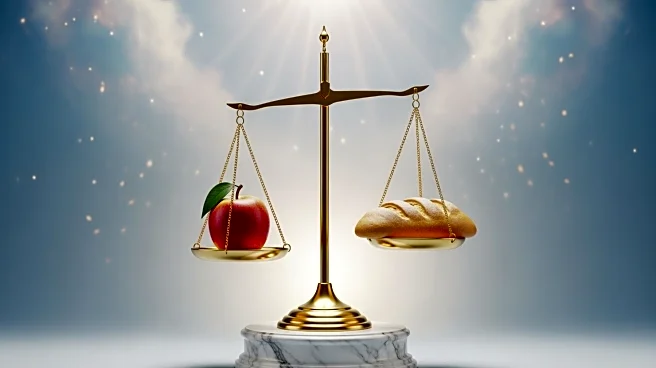What's Happening?
Pope Leo XIV addressed the Food and Agriculture Organization of the United Nations (FAO) in Rome, emphasizing the urgent need for global responsibility in combating hunger. During the World Food Day event,
he condemned the use of food as a weapon in conflicts, describing it as a 'cruel strategy' that violates the right to life. The Pope highlighted the ethical failure of allowing millions to die from hunger, calling it a 'historical sin.' He urged for real solutions rather than mere slogans, stressing the importance of multilateralism and international cooperation to address the root causes of hunger. The Pope's remarks were made in the presence of notable figures such as Italian Prime Minister Giorgia Meloni and former U.N. Secretary-General Ban Ki-moon.
Why It's Important?
The Pope's address underscores the critical issue of global hunger, which remains a significant challenge despite advancements in agriculture and food distribution. His condemnation of using food as a weapon highlights the intersection of humanitarian issues with geopolitical conflicts. The call for genuine commitment rather than superficial declarations is a push for actionable change in international policy and cooperation. This appeal is significant for policymakers, humanitarian organizations, and global leaders, as it emphasizes the moral imperative to address hunger and poverty. The Pope's message may influence future discussions and actions within international forums, potentially leading to more robust strategies to combat hunger.
What's Next?
Following the Pope's address, there may be increased pressure on international bodies and governments to prioritize hunger eradication in their agendas. The FAO and other related organizations might intensify efforts to implement sustainable solutions and foster cooperation among nations. Political leaders could face calls to allocate more resources towards food security initiatives and to reconsider policies that contribute to food scarcity. The Pope's emphasis on multilateralism suggests potential diplomatic engagements aimed at forming alliances to tackle hunger collectively. Additionally, there may be a renewed focus on ethical considerations in policy-making, particularly in regions affected by conflict.
Beyond the Headlines
The Pope's speech also touches on deeper ethical and cultural dimensions, challenging the prevailing political and economic paradigms that prioritize profit over human welfare. His call to reconsider lifestyles and share the pain of those suffering from hunger invites a broader reflection on societal values and priorities. This could lead to a cultural shift towards greater empathy and solidarity, influencing not only policy but also individual and community actions. The emphasis on faith, hope, and love as essential components in addressing hunger highlights the role of spiritual and moral leadership in global issues.









